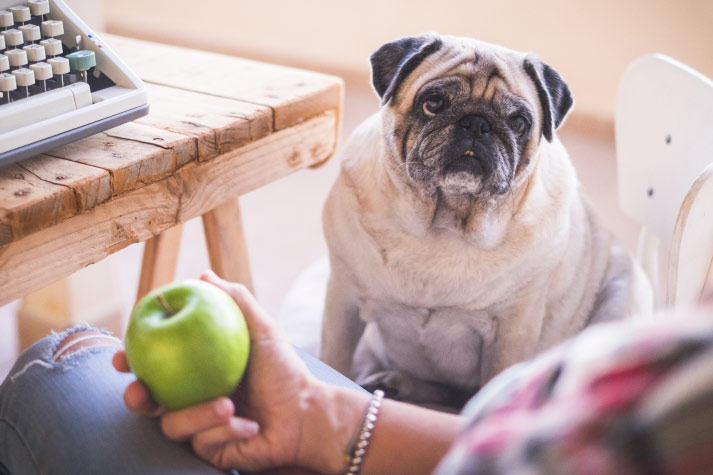
23 Oct
What Fruits are Good for Your Dog?
Fruits are one of nature's powerhouses. Packing a host of vital vitamins and essential minerals as well as being delicious, eating a selection of fruits every day brings a host of nutrition benefits, helps avoid deficiencies, and reduces the risk of disease. Not to mention they make for brilliant treats to snack on.
However, not everything that's safe for you is safe for your dog. Our furry friends have different dietary requirements than ours, and while they show great enthusiasm in eating (and will eat almost anything), the reality is not everything your dog sinks their teeth into is good for their health.
It's not uncommon for a pet owner to feed their dog leftover scraps of food. But your pet cannot express to you when they have ingested something that's harmful for them, so it’s the owner’s responsibility to make sure that their companion only eats what’s good for them.
You may be wondering then, is it even healthy for my dog to eat fruits? Aren’t dog’s carnivores? The answer to that is yes and no. Yes, dogs can eat fruits, and no, dogs are omnivores, and a balanced diet for them includes a variety of fruits, vegetables, meat, and grains.
Fruits Safe for Your Dog to Eat
So yes, your dog can eat fruits. The next thought on your mind may be, how do I know what fruits are good for my dog? What fruits are going to boost their health, and which ones are detrimental to it? What precautions should you take before serving certain fruits, and which ones to avoid altogether?
Fruits that Are Safe for Dogs to Eat
- Apples: Good source of vitamin A and C. Remove the seeds and core before serving.
- Oranges: Good source of vitamin C and fibre. Remove the flesh and try to remove the seeds before serving.
- Cucumbers: Good source of vitamin C and K with low sugar and calorie count.
- Peaches: Make sure to remove the pit before serving.
- Watermelon: Make sure to remove the seeds before serving.
- Mangoes: Excellent source of vitamins A, C, and E, but also high on sugar. Serve sparingly.
- Bananas: High in potassium and vitamins, but also high in sugar content. Serve as a treat.
- Strawberries: Strawberries make for an excellent snack and they are good for your dog’s teeth too. Make sure to only serve fresh strawberries, not strawberry syrup or canned strawberries.
Fruits to Avoid at all Costs for Your Dog
As you may notice, a few fruits are safe for your dog. Some fruits require more prep than others, but for the most part you can serve an assortment of fruits to your pet. Fruits are safe to feed your pooch and can act as a replacement for store bought treats.
However, there are a few fruits that you should never let your dog near, at any cost. These foods can be toxic in low and high quantities, meaning they should be kept as far away from your dog as possible. If you do have any of these fruits at home, keep them covered and out of your dog’s reach; since some of these fruits are toxic to dogs, there’s no reason to risk your dog’s health.
Fruits your Dog Cannot Eat
- Grapes/raisins: This fruit may be commonplace in households, but even a small amount can be extremely fatal to your dog. Make sure to store them well out of reach of your dog.
- Cherries: The cherry plant and its seeds contain cyanide and should not be fed to your dog. While they can eat the fruit around the seed, it is better to avoid it completely.
- Tomatoes: While the ripe fruit is not toxic to dogs, the green stem can upset their stomach. Best to simply avoid it.
- Potatoes (raw): Like tomato stems, raw potatoes have solanine, which upsets a dog's stomach.
- Avocados: the pit, skin, and leaves of the avocado fruit contains persin, which is a toxin and causes diarrhoea and vomiting.
If you suspect your dog has ingested something they shouldn't have, look out for the following symptoms:
- Vomiting
- Diarrhoea
- Dehydration
- Twitching
- Low energy levels/ fatigue
- Constipation
- Change in normal posture
If you observe any of these symptoms or are unsure about what to do, immediately get in touch with a vet, as your dog may need serious care. Keep these foods off the shelves or tables where your dog might reach them, and make sure you follow precautions when you do serve your dog fruits.
Fruits are excellent snacks and a great source of vitamins and minerals. While some fruits are good for your dog and bring health benefits, some are bad for their health, and it is up to the owner to make sure that their dog is eating correctly. Make sure to do your research and consult your vet before making any changes to your pet’s diet and serve fruits and vegetables that are safe for them.






AUTHOR’S BIO
Carry My Pet
Passionate pet enthusiasts and globetrotters, dedicated to easing furry friends' journeys worldwide. Penning tales of compassion at CarryMyPet, where every relocation is a tail-wagging adventure.